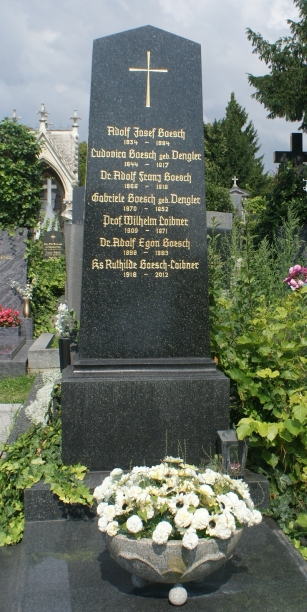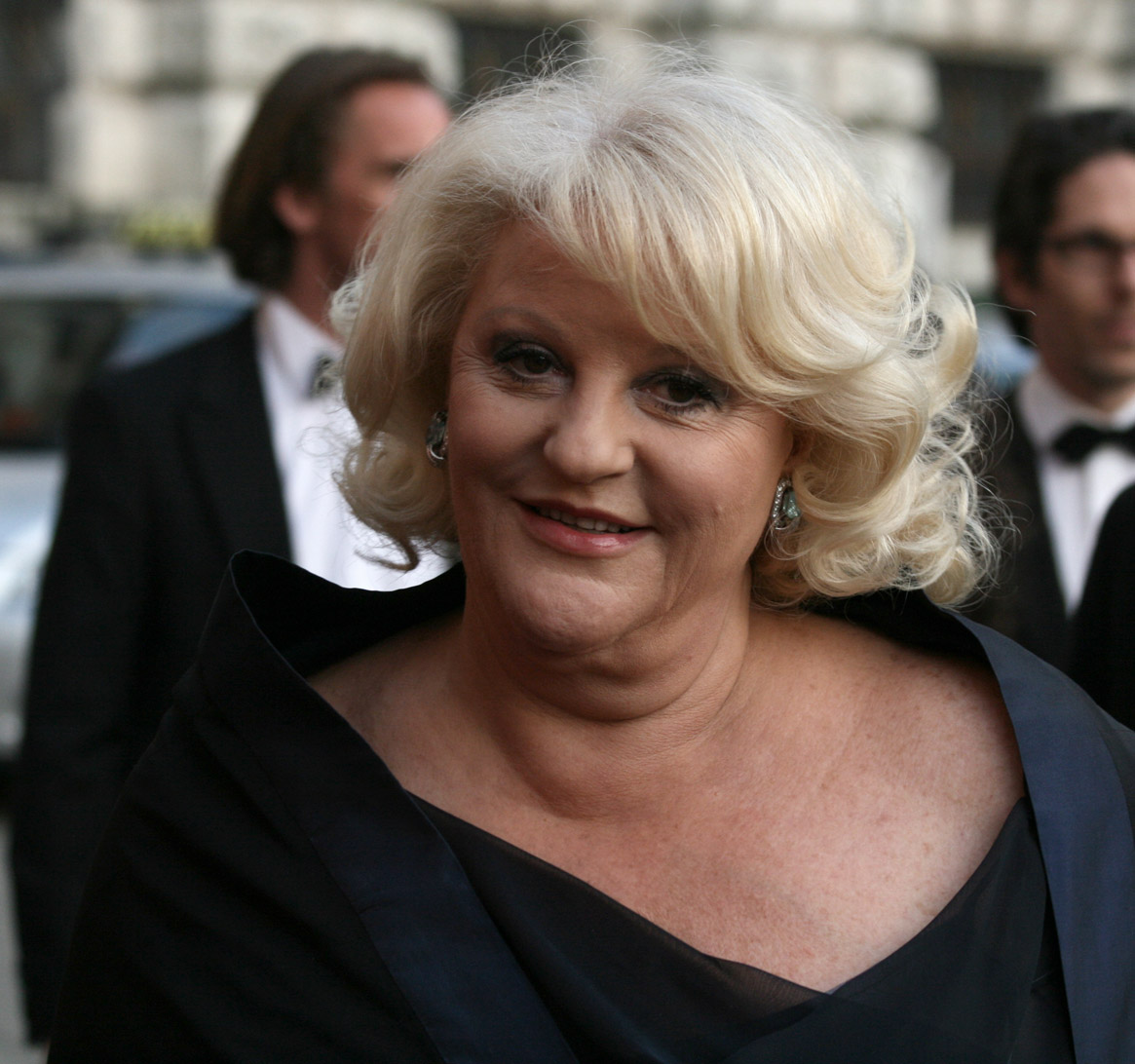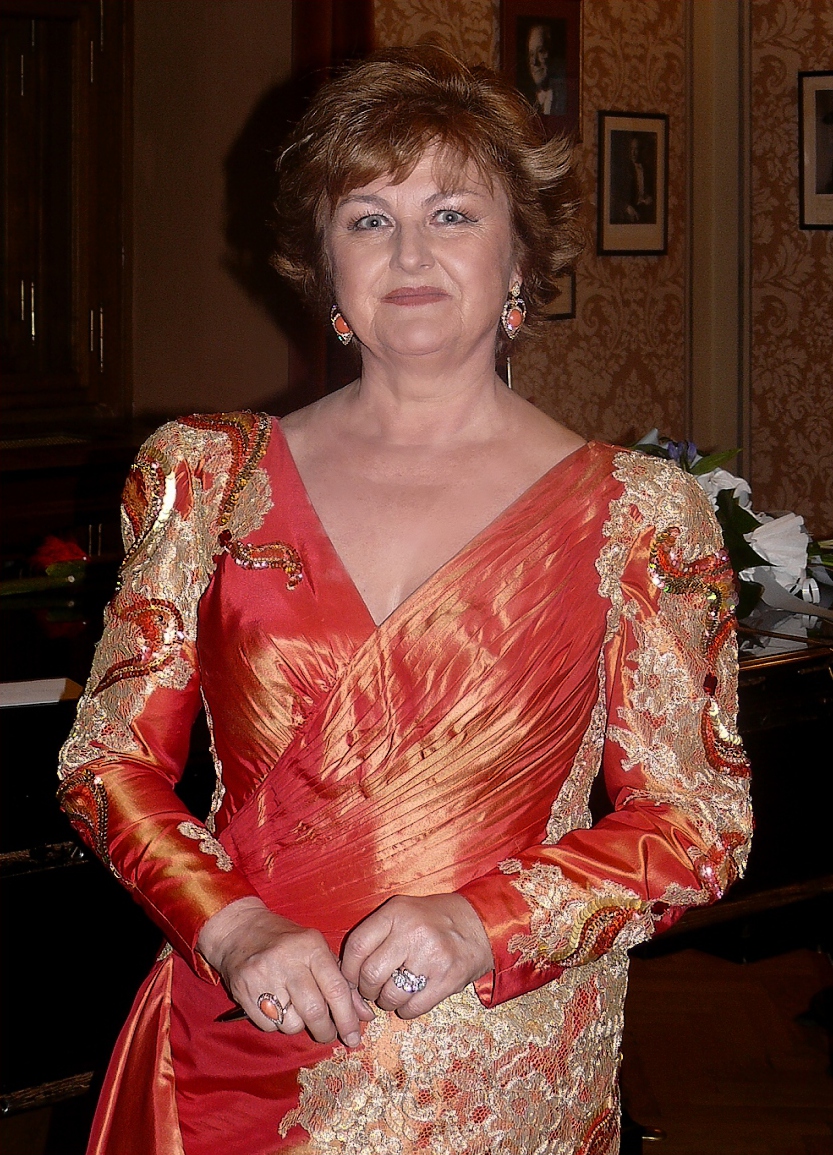|
Ruthilde Boesch
Ruthilde Boesch, born Ruthilde Klösterer, married also Ruthilde Loibner (9 January 1918 – 20 January 2012) was an Austrian soprano in opera, operetta, song and concert, and a vocal pedagogue. She was a member of the Vienna State Opera for decades, and later an influential voice teacher. Life and career Born in Braunau am Inn, Klösterer grew up in Mödling. After her school years she studied singing at the Wiener Musikakademie with Fritzi Lahr-Goldschmied, Alfred Jerger and Judith Hellwig, among others. She studied further with Helene Wildbrunn at the ''Meisterklasse'' of the Akademie from 1936 to 1938, and an intensive role study with the Mozart conductor Josef Krips. From 1945 to 1971 the soprano's "main importance was to be found in the field of coloratura soubrette". She was a member of the Vienna State Opera from 1947, where she made her debut as Susanna in ''Le nozze di Figaro''. She took part in 387 performances in 38 different roles, appearing in more Mozart roles, ... [...More Info...] [...Related Items...] OR: [Wikipedia] [Google] [Baidu] |
Braunau Am Inn
Braunau am Inn (; German for "Braunau on the Inn") is a town in Upper Austria on the border with Germany. It is known for being the birthplace of Adolf Hitler. Geography The town is on the lower river Inn below its confluence with the Salzach, where it forms the border with the German state of Bavaria, halfway on the road between the state capital Linz and the Bavarian capital Munich, about north of Salzburg. Braunau is connected by bridges over the Inn with its Bavarian counterpart Simbach am Inn. A traditional port of entry, all border controls have been abolished since the implementation of the Schengen Agreement by Austria in 1997. The town gave its name to the administrative district ('). The population of Braunau am Inn was 16,182 in 2011. The municipal area comprises the cadastral communities of Braunau am Inn, Osternberg, and Ranshofen. History While the abbey of Ranshofen was already mentioned in the course of the deposition of Tassilo III, Duke of Bavaria, in ... [...More Info...] [...Related Items...] OR: [Wikipedia] [Google] [Baidu] |
The Tales Of Hoffmann
''The Tales of Hoffmann'' (French: ) is an by Jacques Offenbach. The French libretto was written by Jules Barbier, based on three short stories by E. T. A. Hoffmann, who is the protagonist of the story. It was Offenbach's final work; he died in October 1880, four months before the premiere. Composition history and sources Offenbach saw a play, , written by Barbier and Michel Carré and produced at the Odéon Theatre in Paris in 1851. After returning from America in 1876, Offenbach learned that Barbier had adapted the play, which had now set to music at the Opéra. Salomon handed the project to Offenbach. Work proceeded slowly, interrupted by the composition of profitable lighter works. Offenbach had a premonition, like Antonia, the heroine of Act 2, that he would die prior to its completion. Offenbach continued working on the opera throughout 1880, attending some rehearsals. On 5 October 1880, he died with the manuscript in his hand, just four months before the opening. ... [...More Info...] [...Related Items...] OR: [Wikipedia] [Google] [Baidu] |
Arno Raunig
The Arno is a river in the Tuscany region of Italy. It is the most important river of central Italy after the Tiber. Source and route The river originates on Monte Falterona in the Casentino area of the Apennines, and initially takes a southward curve. The river turns to the west near Arezzo passing through Florence, Empoli and Pisa, flowing into the Tyrrhenian Sea at Marina di Pisa. With a length of , it is the largest river in the region. It has many tributaries: Sieve at long, Bisenzio at , Ombrone Pistoiese at , and the Era, Elsa, Pesa, and Pescia. The drainage basin amounts to more than and drains the waters of the following subbasins: *The Casentino, in the province of Arezzo, formed by the upper course of the river until its confluence with the Maestro della Chiana channel. *The Val di Chiana, a plain drained in the 18th century, which until then had been a marshy area tributary of the Tiber. *The upper Valdarno, a long valley bordered on the east by the Pratomag ... [...More Info...] [...Related Items...] OR: [Wikipedia] [Google] [Baidu] |
Marika Lichter
Marika Lichter (Vienna en, Viennese , iso_code = AT-9 , registration_plate = W , postal_code_type = Postal code , postal_code = , timezone = CET , utc_offset = +1 , timezone_DST ..., 24 October 1949) is an Austrian singer and actress who was popular as a pop singer in the early 1970s, before moving into musicals and acting. Her career experienced a revival from 2006 with ''Dancing Stars''.Profil - Volume 37 - Page 26 2006 „Dancing Stars"-Siegerin Marika Lichter über Antisemitismus, ihren Hang zur Sozialdemokratie und ihre neue Rolle als Mutmacherin. „Mein seliger ... Marika Lichter, 56. ... wurde 1949 geboren, sehr knapp nach den furchtbaren Erlebnissen. Discography Singles * "Adieu" (1969) * Ich hab einem Kummer (1970) * Wieder / Tu nicht so (1970) * Ungeküßt / Männer sind so * Dann wird es wieder schön sein / Allein * CD Musik ist Trumpf (2006) nur 3 Titel: Musik ist Trumpf ... [...More Info...] [...Related Items...] OR: [Wikipedia] [Google] [Baidu] |
Edith Mathis
Edith Mathis (born 11 February 1938) is a Swiss soprano and a leading exponent of the works of Wolfgang Amadeus Mozart worldwide. She is known for parts in Mozart operas, but also took part in premieres of operas such as Henze's '' Der junge Lord''. Her voice was featured in a key scene of the film ''The Shawshank Redemption'', joining with that of Gundula Janowitz in a duet from ''Le Nozze di Figaro'', "soar ngover a prison yard, signifying joy and hope in a world of despair," as described in a 2014 article in ''The New York Times''. Career Mathis was born and studied in Lucerne, and made her operatic debut in 1956 as the second boy in ''Die Zauberflöte''. She continued gaining stage experience in her native Switzerland for the next three years. Her first appearance abroad was at the Cologne Opera in 1959. In the early 1960s she made frequent guest appearances in Hamburg, at the Glyndebourne Festival, and the Salzburg Festival. In 1963, she became a member of the Deutsche Op ... [...More Info...] [...Related Items...] OR: [Wikipedia] [Google] [Baidu] |
Florian Boesch
Florian Boesch (born 17 May 1971) is an Austrian bass-baritone, voice teacher and opera singer, who is especially known as a Lieder interpreter. Life Boesch was born in Saarbrücken, West Germany, and is the son of Christian Boesch.Barbara Boisits, Georg Demcisin: Boesch, Familie. In ''Oesterreichisches Musiklexikon''. Online edition, Vienna 2002 ff., ; Print edition: vol 1, Österreichische Akademie der Wissenschaften press, Vienna 2002, . He took his first singing lessons from his grandmother, Kammersängerin Ruthilde Boesch, and later studied lied and oratorio at the Musikhochschule Wien with Robert Holl from 1997. He made his debut with a recital in the Vienna Musikverein. In 2002, he first appeared at the Schubertiade in Schwarzenberg. At the end of 2003, he appeared as Papageno in Mozart's ''Die Zauberflöte'' at the Opernhaus Zürich, and subsequently sang at the Volksoper Wien, at the Staatstheater Stuttgart, the Bregenz Festival, the Styriarte Graz, the Staatsoper H ... [...More Info...] [...Related Items...] OR: [Wikipedia] [Google] [Baidu] |
Christian Boesch
Christian Boesch (born 27 July 1941) is an Austrian operatic baritone. He is the son of the soprano Ruthilde Boesch, and studied at the University of Music and Performing Arts Vienna, from 1959 to 1964. He was the pupil of Alfred Jerger, and made his official debut at the Stadttheater, Bern, in 1966. He joined the Vienna Volksoper in 1975. It was in 1978 when Boesch came to prominence, as Papageno in ''Die Zauberflöte'', at the Salzburg Festival, in Jean-Pierre Ponnelle's production, conducted by James Levine. The next year, the singing-actor made his debut at the Metropolitan Opera, as Papageno. He returned for the same opera in 1981 (now with Lucia Popp and Gail Robinson alternating as Pamina, and Zdzisława Donat as the Queen of Night), and the same season sang Monsieur Presto in the Met premiere of ''Les mamelles de Tirésias'' (directed by John Dexter). In 1983, he appeared again at that theatre for their Centennial Gala and ''Don Giovanni'' (as Masetto), opposite James Mor ... [...More Info...] [...Related Items...] OR: [Wikipedia] [Google] [Baidu] |
Genia Kühmeier
Genia Kühmeier (born 1975) is an Austrian operatic soprano who has appeared internationally in opera and concert. She made her debut at the Vienna State Opera as Pamina in Mozart's ''Die Zauberflöte'' in 2003, and sang the role also at the Salzburg Festival and the Metropolitan Opera. Career Born in Salzburg, Kühmeier grew up in Grödig. She attended elementary school, an economics grammar school and an educational institution for kindergarten teachers in Salzburg. She dropped out of that school in 1993 in order to study singing teaching at the Mozarteum until 1997, when she moved to the University of Music and Performing Arts Vienna to study solo singing. She enhanced her studies by master classes with Ruthilde Boesch, Marjana Lipovšek and Margarita Lilowa, all Kammersängerin. In 2002 she won the 8th in Salzburg in the singing category. In 2003 Kühmeier became a member of the ensemble at the Vienna State Opera as a Karajan scholarship holder, and remained until 2006. ... [...More Info...] [...Related Items...] OR: [Wikipedia] [Google] [Baidu] |
Eva Lind
Eva Lind (born 14 June 1966) is an Austrian soprano singer and TV presenter. Since her international breakthrough in 1985, she specialises in coloratura soprano roles in operas and operettas, besides maintaining an active career in concerts and recitals. Lind is famous for her television appearances, both as performer and presenter. She has hosted several music programs, most notably ARD's ''Straße der Lieder'' from 2003 to 2008, alongside Gotthilf Fischer. Andrew Lamb in ''Gramophone'' described her voice as "sheer delight, fresh, crisp, clear, beautifully agile and with superb trills." Life and career Education Lind was born in Innsbruck. She began her vocal training at the Tyrol State Conservatory in her native city, and won the Austrian competition Jugend musiziert in 1983. In the same year, she debuted as Flowermaiden in Wagner's ''Parsifal'' at the Tyrolean State Theatre. While studying philosophy, journalism and theatre studies at the University of Vienna she continu ... [...More Info...] [...Related Items...] OR: [Wikipedia] [Google] [Baidu] |
Edita Gruberová
Edita Gruberová (; 23 December 1946 – 18 October 2021) was a Slovak coloratura soprano. She made her stage debut in Bratislava in 1968 as Rosina in Rossini's '' Il barbiere di Siviglia'', and successfully auditioned at the Vienna State Opera the following year, which became her base. She received international recognition for roles such as Mozart's Queen of the Night in ''Die Zauberflöte'' and Zerbinetta in ''Ariadne auf Naxos'' by Richard Strauss. In her later career, she explored heavier roles in the Italian bel canto repertoire, such as the title role in Donizetti's ''Lucia di Lammermoor'', and Elvira in Bellini's ''I puritani''. In 2019, she portrayed Elisabetta in Donizetti's ''Roberto Devereux'', who leaves her throne, concluding a stage career performing leading roles over 51 years. She is remembered as the "" (Slovak Nightingale), and as prima donna assoluta. Early life and education Edita Gruberová was born on 23 December 1946 in Rača, Bratislava, to a Germa ... [...More Info...] [...Related Items...] OR: [Wikipedia] [Google] [Baidu] |
Bregenz Festival
Bregenzer Festspiele (; Bregenz Festival) is a performing arts festival which is held every July and August in Bregenz in Vorarlberg (Austria). It features a large floating stage which is situated on Lake Constance. History The Festival became an international event in its first year 1946, one year after World War II. People from Germany, Switzerland and France came to the festival. Two stages were created out of floating barges. One barge for the Vienna Symphony Orchestra and the other barge for carrying stage structures. The Vienna Symphony Orchestra is the biggest contributor to the Festival. This orchestra has a performance spot every year since the beginning of the festival. They have their own stage area and other venues used thorough out the festival. Every year the orchestra has a different conductor for each piece because it is considered the conductors performance. Kornmarktplatz, vorarlberg museum is the venture they are using for the 2016 Festival. In 2001, the f ... [...More Info...] [...Related Items...] OR: [Wikipedia] [Google] [Baidu] |
Wilhelm Furtwängler
Gustav Heinrich Ernst Martin Wilhelm Furtwängler ( , , ; 25 January 188630 November 1954) was a German conductor and composer. He is widely regarded as one of the greatest symphonic and operatic conductors of the 20th century. He was a major influence for many later conductors, and his name is often mentioned when discussing their interpretative styles. Furtwängler was principal conductor of the Berlin Philharmonic between 1922 and 1945, and from 1952 until 1954. He was also principal conductor of the Gewandhaus Orchestra (1922–26), and was a guest conductor of other major orchestras including the Vienna Philharmonic. Although not an adherent of Nazism, he was the leading conductor to remain in Germany during the Nazi regime. Despite his open opposition to antisemitism and the ubiquity of Nazi symbolism, the regime did not seek to suppress him, at Joseph Goebbels' insistence, for propaganda reasons. This situation caused lasting controversy, and the extent to which his ... [...More Info...] [...Related Items...] OR: [Wikipedia] [Google] [Baidu] |








